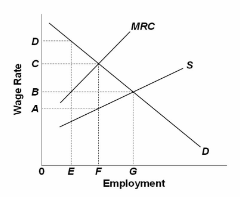Keynes called money people hold to make routine day-to-day purchases the:
a. transactions demand for holding money.
b. precautionary demand for holding money.
c. speculative demand for holding money.
d. store of value demand for holding money.
a
Economics
You might also like to view...
Refer to the diagram. If this labor market is purely competitive, the wage rate and level of employment respectively will be:

A. D and E.
B. C and E.
C. B and G.
D. B and F.
Economics
Which concept compares the share of total wealth in society that is received by different groups?
a. Income inequality b. Poverty line c. Poverty rate d. Financial distribution
Economics